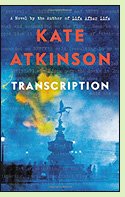Transcription
by Kate Atkinson
Reviewed by Margaret Tomlinson

Transcription is set in 1940 as the English anxiously watch both the increasing aggressiveness of Nazi Germany
and the Nazi sympathizers in their own midst. Eighteen-year-old Juliet is
recruited for an MI5 job transcribing interviews with a group of these
sympathizers who believe they are meeting with a representative of Nazi
Germany.
Juliet's
colleagues frequently resort to dry humor as they pursue a potentially dangerous but often
absurd project. An informant reports a woman "hanging out her nappies on
the line in a way that 'suggested semaphore.'" Juliet herself is sometimes naïvely humorous in her attempts at sophistication. But a tense awareness of
danger underlies the humor.
The
story moves back and forth between 1940 and 1950, when
Juliet is working on children's radio programs for the BBC. The later story hints
at something very serious that happened in 1940 which continues to haunt both
Juliet and her former colleagues. During the early part of the novel these hints,
along with a gathering sense that Juliet may not be able to trust all of her
colleagues, lend suspense to the story. After all, the skill in dissembling
that good MI5 agents need is also the skill a good double agent would employ.
During the latter part of the novel, tension builds as Juliet is given more
responsibility. Mishaps that she and her colleagues have been able to finesse during
the transcription project could now have extreme
consequences.
With its clever twists, Transcription can be enjoyed simply at the level of plot, but it rises well above the usual genre of WWII spy novels. The author's attention to human nature and historical detail, along with an utter absence of cliché, bring the characters to life with exceptional realism. Thoughtful, unforced insights about the nature of deceit, even in as good a cause as fighting fascism, seem especially relevant as we live through a time that, in many ways, seems to echo the 1940s. (2018; 343 pages, including an Author's Note discussing the history behind the fiction)
More about Transcription at Powell's Books or The Book DepositoryOther novels set during WWII:
Life After Life by Kate Atkinson (2013), a masterpiece of innovative fiction about a character who is reborn into the same life many times and makes different choices at crucial points, with exceptional consequences including, in one life, an attempt to assassinate Hitler. See review or more info at Powell's Books.
Blackout by Connie Willis (2010), about time-traveling historians who become stranded in England during the Blitz; won 2010 Nebula and Hugo awards. See review or more info at Powell's Books
All Clear by Connie Willis (2011), about time-traveling historians stranded in England during World War II who suspect that, contrary to the conclusions of experts about the nature of time travel, their actions may have affected events sufficiently to alter the outcome of the war; sequel to Blackout. More info
Nonfiction about espionage and Nazi sympathizers in Britain:
The Secret War Between the Wars: MI5 in the 1920s and 1930s by Kevin Quinlan (2014). More info
The M Room: Secret Listeners Who Bugged the Nazis in WW2 by Helen Fry (2012). More info
Patriotism Perverted: Captain Ramsay, the Right Club, and British Anti-Semitism, 1939-1940 by Richard Griffiths (2010). More info
Online:
The History of MI5 at the official MI5 website
Back to WWII Europe, Home Front
Back to Directory of Book Reviews